St Andrews
About Andrew Cusack
 Writer, web designer, etc.; born in New York; educated in Argentina, Scotland, and South Africa; now based in London.
Writer, web designer, etc.; born in New York; educated in Argentina, Scotland, and South Africa; now based in London. read more
News
Blogs
Reviews & Periodicals
Arts & Design
World
France
Mitteleuropa
Knickerbockers
Argentina
The Levant
Africa
Cape of Good Hope
Netherlands
Scandinavia
Québec
India
Muscovy
Germany
Academica
The Rectorial Festivities
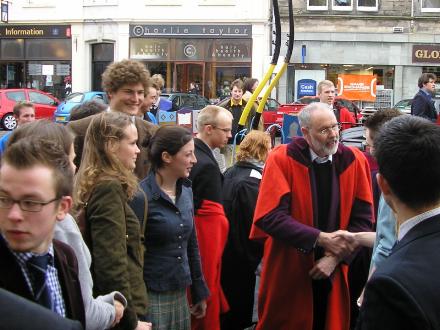
How one enjoys the traditional and ceremonial side of university life! Having duly elected Simon Pepper OBE as the new Lord Rector of the Universitas Sancti Andreae, the usual rigamarole of festivities and rites recently took place. The first is the Rectorial Drag, in which the Blues of the University drag the new Lord Rector around the town in a carriage. Along the way he makes various stops, mostly at public houses, in which a number of student groups and the like present him with gifts and drinks. We in the Boat Club arranged to meet the Lord Rector at the Central bar in Market Street. Above (and below), having alighted from his carriage, the Lord Rector greets a number of students, among them Felix Lobkowicz, the recently-elected President of the Boat Club, and Chris Kololian, the outgoing president. (more…)
Thoughts of Late
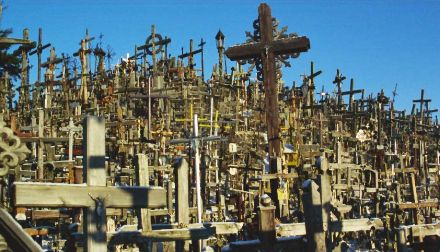
The Hill of Crosses in Lithuania. Over the years, the faithful left crosses on this hill to praise God and signify their appreciation for the many graces and mercies bestowed by Him. During the Soviet occupation of Lithuania, the hill was twice demolished and cleared by the Communists. Each time it was reconstructed by the people, and on its third appearance the Soviets finally allowed it to stay. Despite strong evidence of Christian faith such as this, the University of St Andrews ‘Christian Union’ claims that Lithuania is a heathen country, ‘with only 35 Christians’.
 During my presence at St Andrews over four years, it has snowed on a few occasions, though never stuck for more than a few minutes. I was much pleased, then, to awake on March 2 and spy through my windows (I never draw the curtains, as I enjoy the early morning sun) a blissful wintry utopia. The auld gray toon had been transformed into a veritable snow-globe, with snowflakes shifting back and forth with the wind as gravity drew them nearer their earthly home. Delightfully, this snow lasted, affording thousands of students myriad opportunities for heavenly mischief and giving me an excuse to put on my trusty Sportos. (Trusty Sportos seen at right).
During my presence at St Andrews over four years, it has snowed on a few occasions, though never stuck for more than a few minutes. I was much pleased, then, to awake on March 2 and spy through my windows (I never draw the curtains, as I enjoy the early morning sun) a blissful wintry utopia. The auld gray toon had been transformed into a veritable snow-globe, with snowflakes shifting back and forth with the wind as gravity drew them nearer their earthly home. Delightfully, this snow lasted, affording thousands of students myriad opportunities for heavenly mischief and giving me an excuse to put on my trusty Sportos. (Trusty Sportos seen at right).
But, woe of woes, I had a presentation to give that afternoon on the mundane and irascibly dull subject of the historiography of Indian/Settler relations in colonial America. I, and about four or five others out of a class of nearly twenty, duly arrived in the Old Library of St. John’s House at the appointed hour. We, the few, pondered where everyone else was. Had they autonomously declared a holiday? Risky business, considering this was a tutorial, and thus required, unlike lectures, of which I likely attended less than a third of my due during the past four years. A kindly secretary came in to inform us that Dr. Hart had cancelled the class and thus we were all free to frolic in the abundant snow to our little hearts’ content. Naturally, I just went to Rosary.
Speaking of Rosary, one day the week previous the post-Rosary revelry nearly drank the town dry. Well, perhaps I ought to give some background to our bliss. The Rosary is said every day Monday through Friday in St. James Church at 1:30 after which we all process across the street to the Common Room in Canmore. One or two of the girls, or Adrian if the girls are absent, make a round of tea for the merry band of Marian devotees. Well, on this frigid day in Scotland (a land of poorly-heated buildings, if one’s lucky enough to have heating on at all), we all huddled by the electric fire in our chairs, surmounted by a large communal blanket. Tom brought a bottle of port, of which we all partook, before I then excused myself to go off and do some equally time-wasting task. Well apparently the Rosary crew finished off that bottle of port, and then went and purchased another one! What’s more, the rapacious dipsomaniacs, once they had finished that bottle of port they emptied the reserve bottle of whiskey I keep hidden behind the German dictionaries in the library upstairs. Disgraceful! I have decided not to replenish the secret reserve, since, to put it in the vernacular parlance, is nae secret anaemoor!
Of course it’s my own fault for leaving it in the Chaplaincy. Should I have hidden it in the chaplaincy of the very friendly heretics over in St. Mary’s Place across from the Students Union, it would have remained unmolested. The worse that could happen would be the Christian Union forming a prayer circle around it and praying for the Good Lord to make it go away. (We Catholics already posess the knowledge on making drink disappear, and how!).
Ah, the ‘Christian Union’! Not in the entire English-speaking world, I daresay, does there exist a more delusional body of people. Everything about them is either hilariously funny or pitably sad, beginning with the irony of their very name. The Christian Union, as it styles itself, actually bans most Christians from joining. Those who wish to sign up (poor fools!) must be willing to sign a statement of faith extolling the tenets of the Evangelical Protestant religion. Thus Catholics, Orthodox, and even most Anglicans are not allowed to join. I have sometimes posited contacting whichever bureau of Britain’s behemoth government is responsible for truth in advertising and trying to get them to get the Christian Union to change their name. ‘Evangelical Society’ would be the most appropriate; while ‘Society of Over-Emotional Self-Deluding Followers of Feel-Good Teddy-Bear Christianity’ might be more accurate we must give some allowance for PR these days.
One of the latest projects of the Christian Union is to work for the ‘Christianization’ of Lithuania, “since there are only 35 Christians in the entire country”. It has apparently escaped the C.U. that Lithuania was Christianised ten centuries ago and has remained a vibrantly Christian country, even through decades of Soviet persecution. But perhaps we should leave them in their self-delusion, if only for the hilarity it provides for the rest of us. One can almost imagine them being given demographic information about the population of heaven, with thousands upon thousands of the patriarchs and prophets of the Old Testament, the apostles, the Church fathers, the martyrs, confessors, priests, nuns, and all the legions of holy souls: “But there are only 35 Christians!”
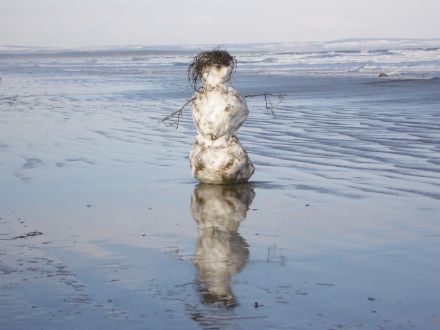
St Andrews Snowfall
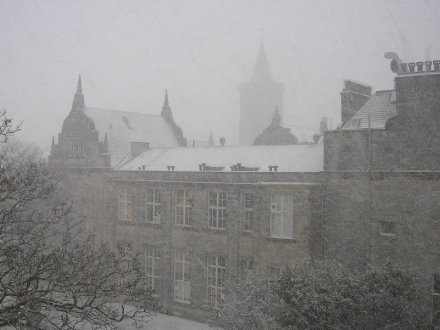
In an act of worship of the goddess Effeciency, the U.K. Government, or the Meteorological Office thereof, declared March 1 to be the beginning of Spring rather than the traditional, astronomical, and accurate Vernal Equinox (March 20). True to form, Mother Nature (a proud woman), decided that, in the interests of putting the upstarts in their proper place, she would open the heavens and thus a bountiful snowfall was produced the ver next day. I took a few snaps from my little chamber in St. Salvator’s Hall for your enjoyment. (more…)
Improvements
REACTIONARIES HAVE FOOLED themselves into believing the world has been getting worse and worse, essentially since the Fall. Progressives meanwhile, heartened by fairly recent progress-heralding genocidal masterpieces such as the French, Russian, and Chinese revolutions, believe the world is getting better and better with the March of Time. But we, the happy middle, – conservatives and traditionalists – know that Man is as Man was and as Man will be, and that we will see days of sadness and terror just as we will see days of greatness and glory. It was found to be greatly encouraging, therefore, when I chanced upon the Mess of the Officer Training Corps here in St Andrews last night and was greeted not by the bilious throbbing beats of noxious rap music, but instead by the dulcet syncopations of Tchaikovsky’s Swan Lake. Under the attentive ear of J.E.B., new President of the Mess Committee, A Squadron, TUOTC, I am happy to report that bad music has been given the old heave-ho.
YET, AS THE commendable is oft accompanied by the regretable, the hallowed pasttime of smoking has tragically been banned in the Mess. This is doubly wounding as the ban has taken place before the Scottish ban on smoking in public places takes effect (March 27), but also because the Mess is Ministry of Defence property and thus effectively exempt from the ban. Alas, the spirit of bureaucracy and nanny-ism has partly infected (some would say taken over) the caverns of the M.o.D. and decrees were handed down from above that smoking would be banned from January 1, 2006. Shameful, as it was one of the best places to enjoy a toke on the old pipe, especially since a pipe rack (donated by J.E.B. himself) was dutifully placed on the mantle below the portrait of Her Majesty. Nonetheless, we look forward to continued improvements under the tenure of Mr. J.E.B., and wish him well.
Return and Remembrance
Well, yours truly has dutifully returned to hallowed Andreanopolis in pursuit of his last Candlemas term ever, to be capped off (Deo gratia) by the awarding of Master of the Arts degree this June. George Ronald Valentine Hastings Irwin picked me up from the airport on Friday morning and expressed his shock that he was graduating on time in the alloted four years and his even greater shock that I too am on course to complete the very same task.
As we drove down the Guardbridge Road towards our ancient seat of learning, the turrets, towers, and spires of the Royal Burgh were completely shrouded in haugh, that peculiar Scottish form of fog that rolls off the North Sea. Returning to dear old Sallies I came upon Dawn and Lisa, the two cleaners responsible for our corridor, chatting in the hallways (as is their wont), welcoming my return while lamenting my longer-than-ordinary absence. Most of the day was spent unpacking my various posessions. Because St. Salvator’s Hall was used to host a conference over the break, all the inhabitants thereof had been forced to pack away their belongings in storage. Thus after picking up my key from the porter and turning the lock on my room, I was greeted not by the welcome signs of my inhabitation but instead by a room bare but for the rearranged furniture, a different lamp (which doesn’t work, unlike the previous one), and the usual New International Version of the Holy Bible in the desk drawer.
Much to my lamentation, I quickly discovered that the great majority of my cohortem had skipped off to Pluscarden Abbey for a few days. Nonetheless, the trusty Alexander O’Hara was amongst the remaining and we met for a pint at the Whey Pat, just outside the town’s remaining city gate, before repairing to the Cellar Bar for a better brew. The following morning I met up with Ishmael for breakfast at the Victoria Café. [TEXT REDACTED]
After breakfast, I fell asleep in the library reading La Vita Nuova (apologies to Mr. Aligheri, but I did finish it when I awoke). After a woefully disappointing luncheon in hall, followed by ever-so-slighly less disappointing but more filling microwave meal to fill my empty belly, I watched Passport to Pimlico, the splendid Ealing Comedy in which the bombed-out inhabitants of a street in Pimlico discover an ancient document revealing that their home turf is actually an independent territory of the Duke of Burgundy. (Upon the revelation, the local Police Constable Spiller exclaims “Blimey, I’m a foreigner!”). When Whitehall bureaucrats interfere with the tiny statelet’s new-found freedom from pub licensing hours and the post-war remnants of rationing, the people of the district unite to defend their liberties in the long tradition of the English peoples. Quoth one character: “We always were English and we always will be English and it’s just because we ARE English that we’re sticking up for our right to be Burgundians!”
After attending the Vigil Mass at St. James, I had dinner at Abigail’s, after which a gang of us drank a few bottles of red while watching Bright Young Things, Stephen Fry’s directorial debut, which would have been much better if it had ended in the same manner as Vile Bodies, the novel by Evelyn Waugh on which the film is based. After that, we started House of Cards, of which I watched an hour before deciding it was necessary to retire. Woke up rather later this morning, missing chapel, but in time to lunch in hall whereupon I was informed by various chapelgoers that the new hymnal, previously delayed by a strike at the Finnish printing works where it is produced, has been introduced. We mused that since it was printed in Finland and the Muslim hordes are going after anything Scandinavian these days, we’re surprised the hymnal’s not being burnt in the streets at the moment. (My, how all conversation turns to Muslims on this side of the pond!). We mulled torching the nearest consulate of an Islamic country, but we concluded that would make us no different from the wicked ochlos, and remembered they have recently suffered a terrible disaster. “No doubt,” one bejant noted, “were it mostly Christians on the ferry, it would be extolled throughout the Muslim world as God reaking vengeance for the Danish cartoons.” After luncheon, I decided to write this post informing you, dear readers, of the latest.
In the mean time, Ezra Pierce texted from Oxford, reminding me of the Feast of the Holy New Martyrs, Confessors, and Passion-Bearers of Russia. Here is an icon depicting the martyrs, who include one of my favorite saints, the Grand Duchess Elizabeth, a widower of the Royal Family who became a nun and a great servant of the poor founding hosptials, convents, and orphanages. After the murder of Tsar St. Nicholas II and his immediate family, the Grand Duchess Elizabeth with a few other members of the Royal Family and their loyal servants who refused to leave them, were hurled down a mineshaft in Alapaevsk by the Communist Secret Police. Despite the great fall, they did not die, and so the Cheka threw grenades down the mineshaft, all of which refused to explode. The victims below could do nothing but sing God’s praises, quite literally, as they began to sang hymns and continued as the Communists sealed the mineshaft. When the bodies were recovered they were shown to have died of starvation. The icon in question also depicts the martyrdom of Archbishop Joachim, whom the Communists crucified, upside-down like St. Peter, on the Royal Doors of the Cathedral of Sebastopol in 1920.
These are stories rarely told, let alone heard, in the West where for so long this evil terror was praised in the lecture halls and academic presses of our universities and elsewhere. It is telling that in our nation’s capital today there is an entire museum devoted to the Holocaust, and similarly Holocaust memorials are worthily to be found in most major cities, while the victims of Communism are virtually forgotten. Not to denigrate the 10 million souls of the Holocaust, but it was small in comparison to first Lenin and Stalin, then Mao, the greatest mass-murderer of all time, and the dozens of murderous regimes spawned by the Russian Revolution. And unlike Nazism, which has been almost totally defeated, Communism and the ideas behind it have saturated the Western world and, while most (not all) of its despotic regimes have fallen Marxism continues to have great influence today.
Yet, at the end of the day, all that is left for us is to continue to pray and fight Evil wherever it may be found. They can destroy every single thing we hold dear – and rest assured they will try – except for our souls which belong to God. And should we find ourselves as victims of Evil we still have nothing to do but sing God’s praises like saints and martyrs of yesterday, today, and eternity.
Sir John Cowperthwaite
St Andrean Responsible for Hong Kong’s ‘Economic Miracle’
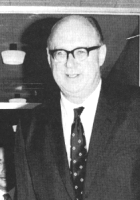 Sir John Cowperthwaite was the main figure responsible for Hong Kong’s economic transformation, lifting millions of people out of poverty. While scholars like Milton Friedman and F. A. Hayek put an intellectual case for the free markets, it was Cowperthwaite who provided the textbook example showing economically liberal policies leading to swift economic development. His practical example provided confidence to the Thatcher and Reagan governments, and was a key influence in China’s post-Mao economic liberalisation.
Sir John Cowperthwaite was the main figure responsible for Hong Kong’s economic transformation, lifting millions of people out of poverty. While scholars like Milton Friedman and F. A. Hayek put an intellectual case for the free markets, it was Cowperthwaite who provided the textbook example showing economically liberal policies leading to swift economic development. His practical example provided confidence to the Thatcher and Reagan governments, and was a key influence in China’s post-Mao economic liberalisation.
Cowperthwaite read classics at St Andrews and Christ’s College, Cambridge. While waiting to be called up by the Cameronians (Scottish Rifles), he went back to St Andrews to study economics. This Scottish education imbibed him with the ideas of the Enlightenment, especially the work of Adam Smith, who had been born nearby in Kirkcaldy. He was a liberal in the 19th century sense, believing that countries should open up to trade unilaterally. In 1941, he joined the Colonial Administrative Service in Hong Kong. When it fell to the Japanese, he was seconded to Sierra Leone as a district officer, before returning in 1946 to help the colony’s economic recovery. “Upon arrival,” the Far Eastern Economic Review put it, “he found it recovering quite nicely without him.” He quickly worked his way up the ranks and was made Financial Secretary in 1961, in charge of its economic policy for a decade.
When he became Financial Secretary, the average Hong Kong resident earned about a quarter of someone living in Britain. By the early 90s, average incomes were higher than Britain’s. Cowperthwaite made Hong Kong the most economically free economy in the world and pursued free trade, refusing to make its citizens buy expensive locally-produced goods if they could import cheaper products from elsewhere. Income tax was never more than a flat rate of fifteen percent. The colony’s lack of natural resources, apart from a harbour, and the fact that it was a food importer, made its success all the more interesting. Cowperthwaite’s policies soon soon attracted the attention of economists like Milton Friedman, whose television series Free to Choose featured Hong Kong’s economic progress in some detail.
Asked what is the key thing poor countries should do, Cowperthwaite once remarked: “They should abolish the Office of National Statistics”. In Hong Kong, he refused to collect all but the most superficial statistics, believing that statistics were dangerous: they would led the state to to fiddle about remedying perceived ills, simultaneously hindering the ability of the market economy to work. This caused consternation in Whitehall: a delegation of civil servants were sent to Hong Kong to find out why employment statistics were not being collected; Cowperthwaite literally sent them home on the next plane back.
Cowperthwaite’s frugality with taxpayers’ money extended to himself. He was offered funds from the Hong Kong Executive to do a much needed upgrade to his official residence, but refused pointing out that since others in Hong Kong did not receive that sort of benefit, he did not see why he should.
Cowperthwaite’s hands off approach, and rejection of the in vogue economic theory, meant he was in daily battle against Whitehall and Westminster. The British government insisted on higher income tax in Singapore; when they told Hong Kong to do the same, Cowperthwaite refused. He was an opponent of giving special benefits to business: when a group of businessmen asked him to provide funds for tunnel across Hong Kong harbour, he argued that if it made economic sense, the private sector would come in and pay for it. It was built privately. His economic instincts were revealed in his first speech as Financial Secretary: “In the long run, the aggregate of decisions of individual businessmen, exercising individual judgment in a free economy, even if often mistaken, is less likely to do harm than the centralised decisions of a government, and certainly the harm is likely to be counteracted faster.”
His ability to pursue policies which, at the time, were deeply unfashionable, was helped by having supportive Hong Kong Governors, Sir Robert Black and Sir David Trench, who both had free market sympathies. Moreover, Cowperthwaite was formidable at arguing his case: as Dennis Healey recalled: “I always retired hurt from my encounters with the redoubtable Financial Secretary.”
From 1972 to 1981, Cowperthwaite was an advisor to Jardine Flemming & Co in Hong Kong. He retired to St Andrews with his wife Sheila and was an active member of the Royal & Ancient. For many years, he spent six months of the year with his wife traveling the world visiting friends and relatives. He was an old school civil servant and, much to the frustration of economists, resisted requests to write an autobiography about his time in Hong Kong, believing that his duty was to serve, not to reveal the minutiae of government business.
– John James Cowperthwaite KBE OBE CMG, Financial Secretary of Hong Kong, born 25 April 1915; died 21 January 2006.
The New PMC
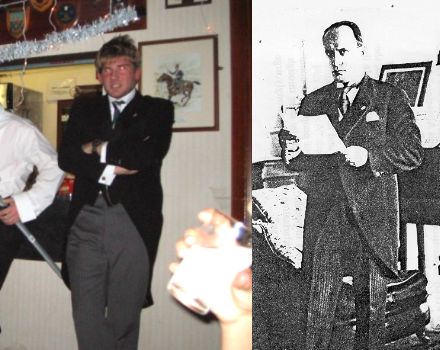
At left: The newly-elected PMC, A Sqn TUOTC, Scotland, 2005. At right: The newly-elected Prime Minister, Italy, 1922. An intriguing juxtaposition.
Though I am still Stateside, I should like extend our slightly belated congratulations to J.E.B., Esq., whom Tom Marshall has described as “the greatest potential cavalryman since Harry Flashman”, on his election to the Presidency of the Mess Committee this past December. Mr. J.E.B. is something of a legend in the Auld Grey Toon and the Mess will benefit from his profound wisdom, not to mention his lack of affection for bad music. A pipe smoker, J.E.B. is the donor of the Mess’s engraved pipe rack which rests on the mantel below the portrait of Her Majesty.
(Photos courtesy of Miss K. Dilworth)
A Splendid Evening
Well tonight was an absolutely splendid evening and a perfect end to my last Martinmas term at St Andrews. It was spent at the beautiful home of Professor and Mrs. John Haldane who warmly invited us in for a wonderful little end-of-term bash with plentiful food and drink. Nunc est bibendum indeed. What’s more is that good cheer and great conversation flowed almost as freely as the wine, and I dare say the dozen-plus of we merry Catholic students had a most enjoyable time. We were all very grateful that Mr. and Mrs. Haldane were kind enough to open their home to us, as they have done in the past.
Rather like the home of Pierre Loti in Rochefort (which, if ever one is in Charente-Maritime, I firmly recommend visiting), the Haldanes’ is unassuming and quite normal on the exterior but the first step inside reveals a splendid little kingdom of assorted treasures. Icons, books, paintings, sketches, engravings, crosses, busts, statues, and so on and so forth line all the walls leaving little free space but at the same time lacking a feeling of crowdedness or chaos. Professor Haldane (recently made a Knight of the Holy Sepulchre) introduced us to a number of the works in his living room including some actual sketches of dueling swordsmen by G.K. Chesterton, prints by Eric Gill, and various other works of art and items of interest such as military medals of ancestors and crusader coins and St Andrean ephemera. While I was wandering through his library, Prof. Haldane and I discussed the splendours of Gothic architecture and the revival of traditional (albeit mostly classical) architecture especially at the University of Notre Dame’s School of Architecture, and architects like Quinlan Terry, Demetri Porphyrios and such.
With plenty of eats and drinks it was quite a merry time and it’s mildly disconcerting that I must awake in only just over five hours to catch my flight home to the Big Apple but, God willing, I will make it. It will be absolutely magnificent to be home in Westchester, to sit by the fire with the dog – or dogs rather since my sister and brother-in-law will be up with their dogs as well – and of course to have the pleasure of driving again. (Ah, Audi A6, how I miss thy German engineering!). Then there are the little splendours of Bronxville with the bookshop and St. Joseph’s and all my friends back in town, not to mention dichotomous Manhattan in all it’s glory. Ah, the wonders of home; deo gratias!
The Chancellor Retireth
So who will replace good Sir Kenneth? The Chancellor is chosen by the General Council of the University of St Andrews, which consists of all graduates and senior academics, so something like 35,000 people are eligible to vote. The following are among those who have been suggested for the position so far:
Noblemen
• The Rt Hon the Lord Cullen of Whitekirk: An alumnus of St Andrews and outgoing Lord President of the Court of Session (Scotland’s highest court).
• James Douglas-Hamilton, Baron Selkirk of Douglas: Former Tory Member of Parliament, now a Tory Member of the Scottish Parliament, and some relation of Harry Douglas-Hamilton who graduated last year.
• The Most Noble James Graham, 8th Duke of Montrose: The only duke still allowed to sit in the House of Lords after Blair’s butchering of the hereditary peer. Actually the Duke of Norfolk sits as well, but that’s ex officio since he’s the Earl Marshal.
Commoners
• Donald Findlay, QC: Unlikely since he’s been virtually blacklisted by the University since he was discovered singing sectarian songs a few years ago.
• George Reid, MSP: Presiding Officer of the Scottish Parliament.
• James Danforth ‘Dan’ Quayle: Forty-fourth Vice President of the United States and apparently a fan of St Andrews (he came to speak here last year).
Might I suggest:
• His Majesty Constantine II, King of the Hellenes: Exiled King of Greece living in London, Olympic Gold Medalist (Sailing), overthrown by some colonels in 1967, and godfather to William Wales ’05.
• Merlin Charles Sainthill Hanbury-Tracy, 7th Baron Sudeley: Chairman of the Constitutional Monarchy Association, Vice-Chancellor of the International Monarchist League.
• Lord Gill: Lord Justice Clerk of the Court of Session and thus Scotland’s second-most senior judge, who if elected might possibly be the first Catholic chancellor since the Protestant Revolution.
• His Royal Highness the Prince Andrew, Duke of York: Fought in the Falklands War, son of the Queen, frequent visitor to St Andrews owing to his Captaincy of the Royal and Ancient Golf Club
• His Royal Highness Prince Michael of Kent: Supporter and Patron of numerous charities as well as Romanov enthusiast.
• The Rt Hon Betty Boothroyd, Baroness Boothroyd: Former Speaker of the House of Commons, now sitting in the Lords as a cross-bencher. Alright, she is a woman, but she’s still pretty good. At 74, she’s at least old enough.
New York & St Andrews
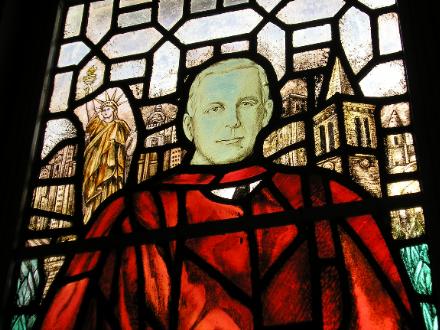
One of the interesting things about living in St. Salvator’s Hall is that one of the beautiful stained-glass windows in our wood-panelled dining hall is dedicated to Edward Harkness, and contains depictions of both the Big Apple and the Auld Gray Toon. Harkness was a benefactor of the University of St Andrews; in fact, he built St. Salvator’s Hall, as well as funding the renovation of the University Chapel (St. Salvator’s) and the restoration of the ruined St. Leonard’s Chapel. (more…)
December Already
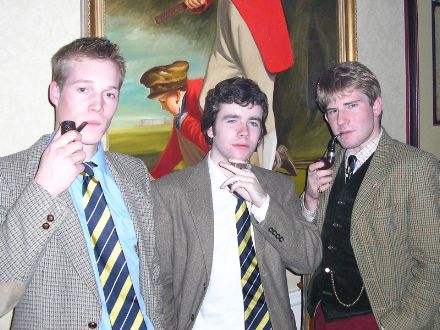
Just when you think you’re about to finish your dissertation, an epidemic of good times breaks out. Here are a few photos of late. (more…)
Fun With Sepia
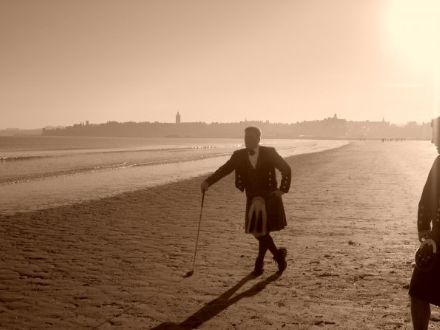
G.R.V.H.I.
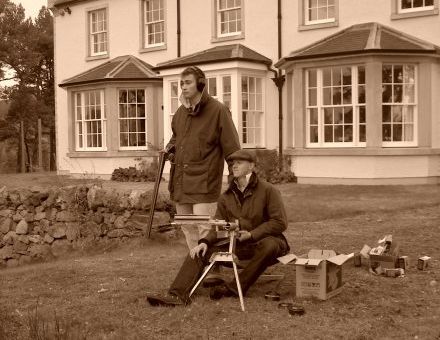
W. Calderhead and C. C..
The Inverness IVs Head
Today we had the pleasure of participating in the Inverness IVs Head Race. It brought forth mixed results. The girls did really well, and one of the guys crews did really well. Our boat on the other hand managed to crash. Twice! But, you know, we added a dash of the spirit of Admiral Farragut, full speed ahead, etc., and still managed to finish the race. Only second to last. Pity the poor bastards who didn’t even manage to beat us. They would’ve had to have sunk or something not to have overtaken us.
Inverness is more or less the capital of the Highlands, thus it’s terribly far north. So far north that when we arrived I said “Why on earth would they stick a country so far north?” which most present found to be a generally amusing comment on the northerliness of our current position until one chap said “Well I’ve been skiing in Trondheim”. Mark my words, whenever one makes a salient point, there’s always someone who’s been skiing in Trondheim.
Nonetheless, we managed to return to St Andrews in a shockingly quick under three hours. I found a few minutes to chat online with Allison Burbage, who in conversation emphathised with the feeling that it is sometimes such a burden to be superior to so many people. Allison would know; she’s superior to most. Then she went away to nurse a G&T in the neighboring dorm room. These crazy kids.
Walking the Dunes
Three sausages for breakfast, followed by reading from Gordon Brook Shepherd’s life of Empress Zita. Purchased my usual sugar doughring from Fisher and Donaldson and the latest Country Life from J&G Innes (all about London this week). The options for luncheon in hall were of asiatic origin so I boycotted and ate about half a loaf of buttered brown bread instead while reading Country Life in the Common Room of Canmore. There were a few people there; Adrian cataloguing the Catholic Truth Society pamphlets out of nothing better to do, Stefano sitting around waiting for his next tutorial, Liam lurking about, and “Ishmael” came in just to be social.
For a while we savaged Stefano because of his desire to show dirty films about Venetian courtesans in Canmore. Canmore, the Catholic Chaplaincy mind you, and Stefano is President of the Catholic Society. “Ishmael” and I slagged him off for being a dirty continental, which he just sort of brushed aside. We thought he was being a bit imperious, perhaps even episcopal, so we decided to turn the chair he was seated in into an impromptu sedia gestatoria. “Ishmael”, Adrian, Liam, and I each took one leg and raised His Foppishness aloft, processed him out of the Common Room, into the hallway, out the door, and into the street. We made as if we were going to give him the old heave-ho but eventually just put him down and ran back inside. Earlier he had taken off his shoes, and thus was stuck in the chair, in the street without any shoes on. By then we had gathered in the window to witness the poor man, yelling at us to carry him aloft “back into the palace”, gesticulating wildly, pointing out his lack of footgear. And we laughed. Oh, how we laughed. Eventually he got tired of our churlish manner and hopped back into the building, avoiding a puddle or two. “I hate you all,” he said, “and you didn’t carry me high enough,” then descending into ramblings about how at the next Catholic Society meeting the president should enter the room in a sedia. We resumed savaging him, and I had another slice of brown bread.
A little while later, I looked out towards the sea and the West Sands and felt them calling me forth. I had not gone for a walk along the beach yet this term, and it seemed as good a time as any. Though the sun was out I brought along my umbrella, just in case, and headed down past the Royal & Ancient Golf Club, past the putting green, and onto the Sands. Walks along the beach must be done at a very relaxed and leisurely rate. Every now and then I came across some driftwood or other such things that wash up on the beaches of Fife and gave them a little prod with my brolly and then, curiousity satisfied, carried along. I travelled about two thirds of the way down before seeking shelter from the breeze in one of the little dales within the dunes, took out some Marcus Aurelius that was hiding in my jacket pocket and had a little read. When I felt that my thirst for the wisdom of the ages was at least temporarily quenched, I decided to head back into town along the dune route. The beach is, as you would imagine, flat, whereas coming back along the dunes is a constant up and down through narrow sandy crevices with lots of reeds and tall grass on either side of you. If you ever visit St Andrews, you must go for a walk along the West Sands, and it’s advisable (if suitably agile) to walk at least partially along the dune paths.
Heading back into town, a Japanese couple asked me to take their photo in front of the R&A, and I duly obliged before slipping into the Quarto bookshop. The Quarto sells used books, and I had a good look around to see if there was anything new to peruse. I had a little read through a book on the history and traditions of the Channel Islands before heading back to hall, and here I am now, transcribing the day’s journey to you. Nothing left today but circuit training for the Boat Club, followed by a meeting of said august body. Hope it doesn’t last too long, else I’ll miss dinner. Some sort of pasta dish tonight; should be at least edible.
Previously: The West Sands
Autumnal Bliss
As I was walking to Mass this morning, I enjoyed listening to the crunch and brush of leaves underfoot that so wonderfully heralds the autumnal season. Today is one of those beautiful fall days when the sun is shining, the air is crisp, the wind slight, and the temperature slightly chilled but nowhere near uncomfortable.
Yesterday evening I had the pleasure of dining with Mr. Michael Fryer, who is surely the funniest man in all of Fife (at least whenever he’s in Fife; he’s an Ulsterman after all). We were both lamenting the fact that, in spite of St Andrews advertising itself as the university at which one is most likely to find one’s spouse, both of us are in our fourth year and remain as yet without prospective permanent ladyfolk. Right then, Dr. Brian Lang (the Principal and Vice-Chancellor, the man who runs the University) happened to walk into the pub and I considered walking over and demanding a refund, but the conversation turned to subjects greater in mundanity.
Another great thing about this time of year is the wearing of the poppy. No one seems to be quite sure when Remembrancetide begins and when the poppy should first be worn. In the absence of any official protocol to my knowledge, I usually judge that as soon as the Scottish Poppy Appeal start collecting money and distributing poppies, then is the time for wearing them. When it comes to Remembrance Sunday itself, I never miss the Festival of Remembrance broadcast on the telly, and neither should you. It’s a disgrace that it’s not broadcast on the web for those throughout the world unable to see it on their televisions. Still, it’s great to see so many poppies worn about town by young and old alike.
Later on last evening I had the added bonus of a pint and smoke with another Irishman, Mr. Alexander O’Hara of Galway. Alec and I are both fans of the pipe, and we enjoyed a good pint and some conversation a little late into the evening. Alec’s company is enjoyable because, like me, he is anti-social, and there are few things more enjoyable than being anti-social with other anti-social people. He’s in the midst of his doctoral thesis on Norwegian saints, which means he has to nitpick through various Latin manuscripts, translating them himself. Poor man! Still, he’ll have something to show for it at the end.
Well, unfortunately there’s work to be done so I must be off. A very happy All Saints’ Day to you all!
There’s Nothing Like A Good Fire
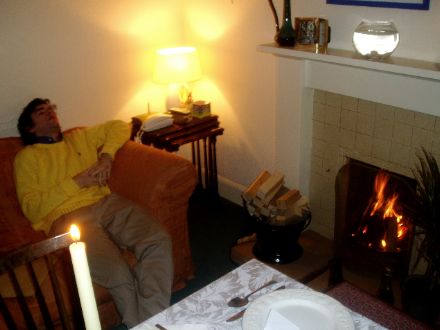
Here we observe the wastrel in his natural habitat: passed out on a sofa in a student flat at the University of St Andrews — the institution with the highest per capita number of wastrels in the British Commonwealth of Nations. In actual fact, Rob & Maria made an official visit up to Andreanopolis this weekend, and Abigail, Adrian, and Pamela graciously through a dinner party in their honour at Step Rock Cottage; Rob and Maria are exiled monarchs of the Catholic dinner party circuit.
The sad thing is this photo was taken before the party even started. I was exhausted from having woken up at 7:00am and spent the entire day rowing at Strathclyde Park that I just dragged myself over to the cottage on Gillespie Wynd at the appointed time in the evening and collapsed on the sofa in front of the crackling fire. It was sublime.
Below you can see Father Freddy, the resident chaplain at Step Rock Cottage, garbed in the appropriate chasuble for the liturgical season. He stands on the window sill blessing the herb garden all day long, or at least he usually does. At the moment he’s on his way to Downside for a retreat.
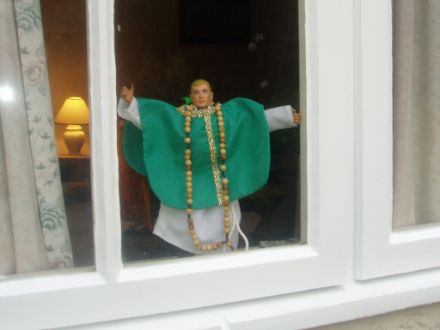
He’s a Philosopher… and He’s Armed!

Has our former Gifford Research Fellow spent too much time considering jus in bello? Nay, rather John Lamont, aka Big John, sends these photos as proof of his efforts to combat the avian flu business that’s going round.

There’s the culprit! Duly nabbed by JL.
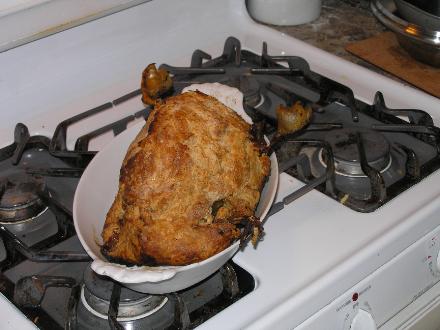
Looks tasty. Rather envious!
Flying the Flag
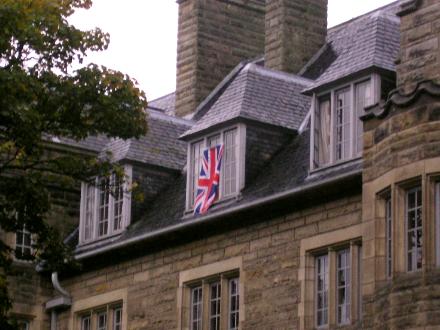
Despite the ban on students flying flags from their windows, I’m happy to say that four students hung Union Jacks out their windows in St Salvator’s Hall today to mark the Battle of Trafalgar. Two were on the front side of hall, two on the back. I took photos of the two on the front side. Mine is above, and the other one below (I don’t know to whom the room belongs).
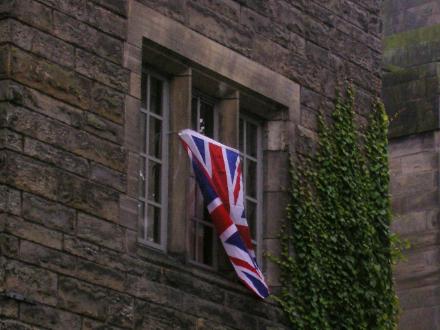
Message from Iraq
George, Cockburn the Younger, and yours truly were sitting in the pub this evening when George got a text message on his phone from none other than 2Lt. W. Calderhead, currently serving in Iraq. It read something like
Very non-chalant. Very Calderhead. Anyhow, a package of goodies shall be heading Bill’s way quite soon.
Is Andrew Cusack a Wastrel?
Tonight a very intelligent friend of mine informed me that she believes I am a wastrel and that I have squandered my university years. I found this very interesting (and a tad funny), considering that it is my firm belief that I have gotten more out of my years at St Andrews than I had ever expected I would. Are there regrets, should’ves, and why-didn’t-I’s? Of course. Hindsight, after all, is 20/20, but I do not regret my relative inattention to grades.
It all comes down to standards. By whose standards does one judge a quartet of university years? I believe that there are a number of ways to measure success, or the lack thereof, during one’s time at university. I myself have never found the pursuit of academic achievement particularly fulfilling. This is not to say I think it is a bad thing; by no means. I have the utmost respect for my friends who excel academically. I always found, for example, David Taylor’s record of achievement particularly worthy of respect and admiration, especially considering he was neither a recluse nor socially awkward. But I think excellence in academics should not be the only way to judge a university career. Whether this is self-serving because I have not excelled academically I leave up to the reader to decide.
In my St Andrews years, so far, I’ve founded, edited, and managed a successful newspaper which has earned high accolades, I’ve co-founded a literary review, I’ve donated my time to committees for multiple terms despite finding it particularly distasteful and unenjoyable, I’ve been president of a private club (which involves not only working with a committee but coördinating and directing it while also having to maintain continuity with the traditions of the group and not peeve the members), I’ve had some pretty good nights on the town, I’ve made friendships that I know will last a lifetime, I’ve (lately) taken up a sporting activity conscienciously, most importantly I’ve done my utmost to be a good Christian as well as to note when, where, and how I have fallen short of that ideal in order to prevent future failings, and on top of all these non-academic things, I have learnt a great deal of knowledge. I don’t have the grades to show for it because I never felt the need to justify what I have learnt and how I have learnt it to an external examiner, besides which much (if not most) of my learning of history, philosophy, and culture during my university years to date has been outside the framework of my courses.
In my view, what I have managed to do in my years is worthwhile and should not be discounted. In comparison to getting 17s, 18s, and 19s in every course, while being social and doing just a few extracurriculur things on the side, I prefer my track record instead. I nonetheless think that both are admirable and worthwhile approaches to university. Contrarily, the young lady in question believes that the academic must be the only important yardstick used to judge these years, and consequently she thinks I a wastrel and strongly disapproves.
(I hope, dear reader, that you will not regard this entry as an exercise in ‘navel-gazing’, as they say. I am not a very self-reflecting, overanalytical person. I am not highly critical of myself, nor do I let myself off easily. It did not particularly irritate, offend, or wound me that I am thought by at least one intelligent person to be a wastrel, but I found it a good opportunity for debate and discussion and so have put forth my view accordingly.)
Search
Instagram: @andcusack
Click here for my Instagram photos.Most Recent Posts
- Gellner’s Prague December 19, 2024
- Monsieur Bayrou December 18, 2024
- Dempsey Heiner, Art Critic December 17, 2024
- Vote AR December 16, 2024
- Articles of Note: 12 December 2024 December 12, 2024
Most Recent Comments
Book Wishlist
Monthly Archives
Categories


